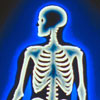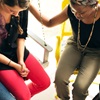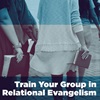Note: This article is excerpted from the resource Physical Presence Matters.
Theologians debate whether we are tripartite beings—made up of spirit, soul, and body—or if we are simply bipartite—spirit/soul (one thing) and body. But regardless of whether spirit and soul make up one part or two, there is no question that our bodies are a fundamental part of who we are.
If that's true, it's odd that we evangelicals typically relegate the body to an unimportant role. Think about it for a moment. We talk about "saving souls" and "rescuing souls from hell," as if there were nothing more to a person than a soul. We also talk about the condition of our hearts and minds, as if our bodies were irrelevant. We have bought into the lie that our bodies are just an unnecessary add-on.
Our Bodies Are Important
But the Bible makes the importance of the body clear. Go back to creation. Before breathing life into Adam, God formed him out of the dust of the earth, and when he made Eve he fashioned her from a rib in Adam's side. They were made of the very same stuff as the rest of creation. Adam and Eve were not merely souls who were given bodies; rather, they were people, human beings, created as body and soul from the dust of the earth and the breath of God.
Even the fact that God created man and woman—that he gave us genders—teaches us how fundamentally important our bodies are. Now whether a soul has a gender I do not know, but there's no question that our bodies have a profound impact on our identity and who we are as people. In 1 Corinthians, Paul elevates the importance of our bodies even further. The city of Corinth was widely known for its sexual immorality. It had even infiltrated the church. In chapter six, Paul writes to the Corinthians that sexual sins are unique in that all other sins are committed outside of our bodies, but sexual sins are committed against (and, presumably, inside of) our bodies. This is especially problematic because—according to Paul—our bodies are the temple of the Holy Spirit. It's hard to imagine a more important role.
We learn in chapter 15 that our bodies, though they die, will be resurrected, and that our resurrected bodies will be imperishable. In other words, we will not be spirits floating around somewhere. We will have bodies for eternity. They will be incorruptible, glorified bodies similar to the body of Christ following his resurrection, but they will be bodies nonetheless. Having a body is fundamental to being human. We were created with them, and are not meant to exist without them. Our bodies are an essential part of who we are.
Our Bodies Impact Our Relationships
If our bodies are an important, fundamental, integral, eternal part of who we are as people, it only makes sense that they would also be fundamental to our interactions with others. Otherwise, we are left with only part of ourselves (our spirits/souls) interacting with a part of others (their spirits/souls), which seems unlikely to yield a deeply meaningful relationship.
Let me illustrate. When I was in college, a friend of mine broke up with her long-time boyfriend. On the spur of the moment I decided to drive three hours to her school to visit her. A few years ago, a friend of my wife's got married. We didn't have much money at the time, but we rented a car and booked a hotel so we could be at her wedding.
When I was 19, my grandmother was dying. I ditched my classes and jumped on a plane to be with her and my dad during her last days.
While my wife and I were dating we spent a summer apart. I accidentally booked a ticket for the wrong day, and I missed my flight. It cost $200 to book a new flight—no small sum for a church intern—but I did it anyway, just to be able to see her.
All of these experiences could have been shared on the phone, in photos, through an e-mail, or over Skype, but the depth and intimacy of those moments could not have been captured adequately through technology. I needed to be there in person. My presence in those situations bonded me with the people around me in a way that can't be replicated with technology. Social media can't replace face-to-face interaction.
Our Bodies Impact Everyday Interactions
Now you might agree that these special times need to be shared in person but argue that everyday, ordinary interaction can happen online. And to a degree, you're right.
I occasionally do a Google Hangout video chat with members of my former small group. Facebook helps me keep up with folks from college. Twitter gives me a peek into the lives of my friends while they're at work. I've even built a friendship via the Internet with Ben—a fellow pastor who lives several hundred miles from me. There is no doubt that real community can be sustained, and even built, online, but there is something different about being present.
Part of it is touch. I know some people are more "touchy" than others, but research has shown that touch is both an important part of communication and key to human thriving. And simple observation seems to indicate the same. Professional athletes—full grown men, the toughest of the tough—embrace after a big win. We all remember our first kiss. A handshake can inspire confidence or exude weakness. When my grandmother passed away, my dad and I stood there and hugged. When we interact solely online, we lose this important dimension of human relationships.
Another piece of it is that simply being with someone—even when nothing of great importance is said or done—builds a relational bond. In fact, I would argue that a great deal of relationship building happens not when we set aside time specifically for conversations (although this is important as well), but when we simply live life together and allow conversations to happen. I have gotten to know some of my closest friends on five-hour road trips and while watching NBA games on television. Think about it: you are not likely to spend two and a half hours on the phone or Skyping with someone you just met. But if you're both fans of the same team, there is a good chance you can watch a sporting event for a few hours together.
I've had the privilege of seeing God work in big ways. I've sat across the table from a fellow Christ-follower as he bears his soul and his sins. I've been the first phone call after a life-changing job offer. I've witnessed one man's three-year transformation from nominal Christian to overseas missionary. I've had my life change as others have mentored me.
In each of these situations it took long talks in the car, dinners together, and shared hobbies to bring the relationship to a point where meaningful life-change could happen. People don't easily let their guard down. We're wary of letting others in to influence us without first getting to know them. So if we want to help people grow spiritually, we have to be willing to enter into their lives, share our lives, and know them deeply.
Social Media Still Has Its Place
So what place does that leave for social media? I would encourage you to use it—there is still a lot of value. Follow your small-group members on Twitter. Organize outings on Facebook. E-mail announcements to the group. If someone is travelling for work, invite them to Skype into your group meeting. One of my church's thriving small groups plans activities with Google Docs.
We even had a group that met only online. Because of their schedules and life circumstances, many of the women found it difficult to physically attend a group, but they were able to share life and build relationships via a multi-way video chat.
All of these are wonderful expressions of community. They are examples of how technology can be leveraged to build relationships. But remember, these digital interactions can't fully replace physical interactions. They can't take the place of an embrace after a long separation, a slap on the back after a good play, a knowing glance at an ironic moment, or simply sharing an experience. Use social media to strengthen and continue relationships, but don't forget about meeting together in person.
—Will Johnston is the Small Group Catalyst for National Community Church in Washington, D.C. Follow him on Twitter @willjohnston. Copyright 2012 by Christianity Today.
Discuss
- How might our understanding of our physical bodies impact our relationships?
- When has the physical presence of someone meant a lot to you? Why did it mean so much?
- How have you been comforted by physical touch? How often do you comfort others this way?










